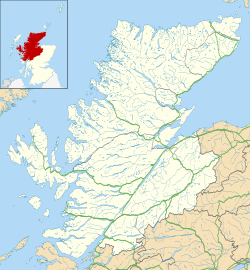Ormiscaig
| |
|---|---|
 | |
Location within the Highland council area | |
| OS grid reference | NG858904 |
| Council area | |
| Country | Scotland |
| Sovereign state | United Kingdom |
| Postcode district | IV22 2 |
| Police | Scotland |
| Fire | Scottish |
| Ambulance | Scottish |
Ormiscaig (Scottish Gaelic : Ormasgaig) is a remote crofting village on the north east shore of Loch Ewe in Achnasheen, Ross-shire, Scottish Highlands [1] and is in the Scottish council area of Highland.
The village of Mellon Charles is less than one mile west along the coast road.
